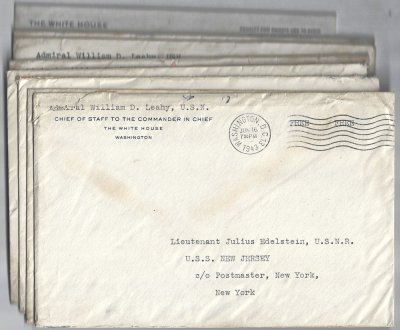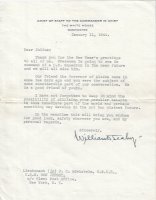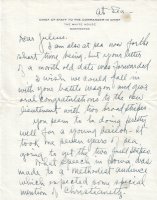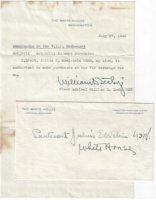Kurt A. Sanftleben, LLC
Admiral William D. Leahy
1943-1945 – Collection of letters documenting the assistance provided by Admiral William D. Leahy, “the second most powerful man in the world,” to boost the career of a long-time journalist friend
List price has been discounted for this show.
$1250
Item Details
Washington DC and "At Sea", 1943-1945, Letters
Very Good
1943-1945 – Collection of letters documenting the assistance provided by Admiral William D. Leahy, “the second most powerful man in the world,” to boost the career of a long-time journalist friend
The eight letters in this group were all sent by Admiral William D. Leahy to his long-time friend and aide, Julius Caesar C. Edelstein between 1943 and 1945. Seven of the letters were typed; one was handwritten. All are enclosed in their official “Chief of Staff to the Commander in Chief / The White House / Washington” envelopes. The last letter was written using “The White House / Washington” stationery. All were postmarked at Washington, DC including the handwritten letter which was written “At Sea”. In nice shape, the letter on White House stationery has some toning.
At the time Leahy wrote these letters, he was the most senior military officer in the United States, having been recalled to active duty by President Franklin Roosevelt to serve as his Chief of Staff to the Commander in Chief, a position that evolved into the Chairman of the Joint Staff following the War. Edelstein was serving as a Lieutenant Junior Grade communications officer aboard the battleship, USS New Jersey, at the time of the first seven, and as a Lieutenant and aide to Leahy when the last was written. The men had become friends in the late 1930s while Leahy was serving as the Governor of Puerto Rico and Edelman covered U. S. territories and island possession for the United Press.
The letters mostly involve the men’s scheming to get Edelstein promoted and reassigned from the fleet to become Leahy’s senior aide.
16 Jun 1943 – “It was good to hear your cheerful telephone voice the other day and to have [a note] from the young sailor at sea. Some day I hope to visit your battle wagon and get low down information on the activities of [my] agent No. 1. You seem to be keeping busy with the numerous activities of a sailor in wartime. . .. Keep on soaking repeat soaking it up. All will pop into its correct place . . . when you write that History of the War with the Huns as seen from the Radio Shack which I hope to read with pride in having once served with its distinguished author. . ..”
15 Sep 1943 – “Many things have happened and much travel has intervened since the receipt of your notes on the ‘promotion to lieutenant’ controversy. We thought everything was arranged but one can never tell exactly where the fault in solving a problem is, even after the event. . .. Wait patiently for time to act . . . the putrid promotion system will eventually reach down to your number regardless of whether you are any good or not. . .. That ship’s newspaper of yours should make them all sit up and take notice. . .. So why worry? . ..”
11 Jan 1944 – “Our friend the Governor of Alaska came in some few days ago and you were the subject of some considerable part of our conversation. . .. I have not forgotten to keep in mind the possibility of utilizing your peculiar talents . . . and perhaps something may develop in the not too distant future. . ..”
19 Feb 1944 – “I am unable to keep up with where anybody is with your rapid changing of geographical locations . . . but I am reasonable sure you are enjoying it, wherever and whatever it is. . .. We have not forgotten that we want you back as Agent No. 1 . . . so do not completely give up the prospect. . .. Hasta la vista.”
8 May 1944 – “Just having returned from a month’s absence of duty of [a] highly secret nature [probably discussions discussing preparations for Overlord, the Allied invasion of Europe], this is the first opportunity to acknowledge your letters. . .. They all came in a bunch like the Washing Banana Line Street Cars. It is, however, good to hear . . . what is bouncing about your head in regard to the future. All I can say about the future is I have it in mind. . .. Either my Puerto Rican friends have passed me up lately or I have been away during their visitations. . .. Travieso has been made Chief Justice. . .. The next Governor will almost certainly be a native . . . so we can continue to be sorry for our friends on the island. . .. I miss your cheering influence. . ..”
Leahy’s behind the scenes machinations to promote Edelman finally paid off.
23 Jul 1944 – “I am also at sea [probably returning from a Honolulu Conference with President Roosevelt, General MacArthur, and Admiral Nimitz where it was decided to liberate first the Philippines instead of Formosa]. I wish I could fall in with your battle wagon and give oral congratulations with the new lieutenant with two broad stripes. That speech [I made] in Iowa [was to] a Methodist audience which expected some special mention of Christianity. Next time I will remember to pin a bouquet on the Pagan heroes. . ..”
As did his effort to bring him to Washington as his aide.
6 Sep 1944 – “I have made time to start something toward getting a chance to see you hereabouts. . .. There have been difficulties but the ball is now rolling and you need not be too much surprised to receive instructions [soon]. . .. Don’t let your fingers stray to where they can be bitten. . ..”
17 July 1945 – “Memorandum to the V.I.P. Exchange . . . Lieut. Julius C. Edelstein USNR, my aide, is authorized to make purchases at the VIP Exchange for me.”
After Leahy retired as a four-star admiral in the late 1930s, he was appointed by President Roosevelt to replace another Roosevelt appointment, Blanton Winship, who had generated an incredible amount of negative press. Roosevelt had sent Winship to Puerto Rico with instructions to repress emerging nationalist resistance to the American presence but he bungled the job, and his ham-handed actions resulted in the Ponce Massacre. Leahy’s presence did much to restore some calm and prepare the island of the possible defense of the Panama Canal if needed in the blossoming world war. While there, he developed a friendship with Edelstein, who promoted Leahy’s actions in the press. During World War Two, Leahy, who received a fifth-star, became recognized as “the second most powerful man in the world,” eclipsed only by President Roosevelt. Following the war, he continued to serve the Truman administration and assisted Winston Churchill in composing his famous “Iron Curtain” speech. His positions on the Greek Civil War and Israeli-Palestinian War conflicted with those of White House advisors Clark Clifford and David Niles who eventually were successful in forcing Leahy’s resignation.
Edelstein, who grew up as a member of Milwaukee’s Jewish middle class, attended the University of Wisconsin from 1927 through 1934 without earning a degree. During that time, he became a journalist and by 1937 had secured a position covering U.S. territories and island possessions for the United Press. He secured a commission as a Navy ensign, perhaps with Leahy’s assistance, and served aboard the USS New Jersey as a communications officer until Leahy could pull strings to bring him to Washington as his aide. Following the war, Edelstein served in various advisory positions to senior government officials in the Philippines, Congress, and New York City which culminated with his appointment as a Vice Chancellor of the City University of New York. In 1955, Edelstein married Rivka Ben‐David, who as a 14-year-old, had fought Palestinians in an Israeli paramilitary unit; unfortunately, Rivka died while giving birth to their daughter in 1961.
(For more information, see O’Brian’s The Second Most Powerful Man in the World, Leahy’s I Was There: The Personal Story of the Chief of Staff to Presidents Roosevelt and Truman and numerous newspaper articles and Wikipedia entries related to Leahy and Edelstein.)
Collections of Leahy papers are held by the Library of Congress and the United States Navy. Edelstein’s papers are located at Columbia University.
A fascinating collection of personal letters providing a behind-the-scenes glimpse at how the “second most powerful man in the world” boosted the career of a journalist who had supported him while serving as the Governor of Puerto Rico.
#10553
Kurt A. Sanftleben, LLC
Kurt A Sanftleben
2129 General Booth Blvd Suite 103-311
Virginia Beach, VA, 23454
United States
Phone: 757-716-3336
Cell: 571-409-0144
Featured Catalogue
Visit Website
Specialities
Paper Americana
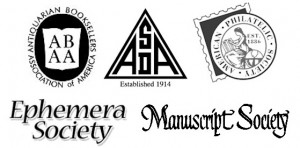
More Information
Booth 23
Shipping and Returns
PAYMENT METHODS ACCEPTED - We accept Checks, Money Orders, and Credit Cards (Visa, MasterCard, American Express, Discover) via PayPal. Interbank transfers via Zelle are free and may be necessary for high-dollar-value transactions. Other domestic and international bank transfers may be possible for an additional fee. Institutions, well-established customers, and ABAA members may be invoiced; all others are asked to prepay. INSTITUTIONAL PURCHASES - We appreciate institutional constraints when it comes to complying with fiscal years, acquisition rules, foundation requirements, and donor concerns, so we’re always willing to hold items for a reasonable time for you to meet organizational purchasing, funding, and billing requirements. TRADE DISCOUNTS - We offer reciprocal trade discounts (sale items included) to known book, ephemera, and postal history dealers when paying by check or money order. Dealers unknown to us may be asked to document their status. DOMESTIC SHIPPING - Unless otherwise specified, orders are normally shipped free of charge by our choice of USPS Media, First Class, or Priority Mail. If requested, other shipping (e.g., UPS, FedEx, USPS Express Mail, etc.) shipping is at cost. INTERNATIONAL SHIPPING - Orders are normally shipped at cost via FedEx, USPS Priority International Mail, and USPS First Class International Mail. RETURNS AND REFUNDS - We accept returns for full refund less shipping for any reason provided the item purchased is returned to us within 14 days and in the same condition as sent. Please notify us in advance of any return shipment.
Open Times
If you'd like to discuss any of these items via Zoom, send me an email at [email protected] or a text at 571-409-0144 to set up a meeting.